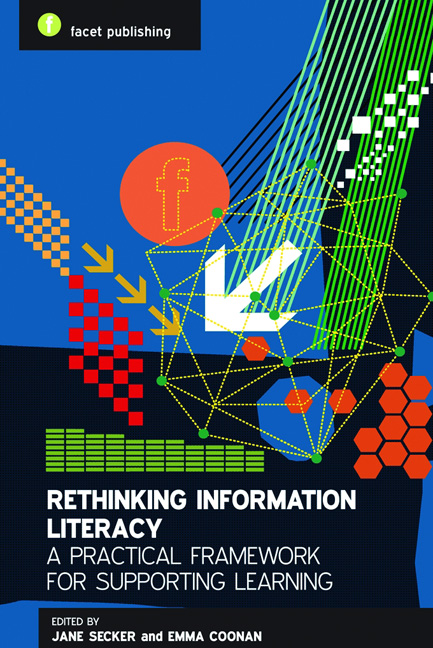Book contents
- Frontmatter
- Contents
- Acknowledgements
- Contributor profiles
- Introduction
- Strand One Transition from school to higher education
- Strand Two Becoming an independent learner
- Strand Three Developing academic literacies
- Strand Four Mapping and evaluating the information landscape
- Strand Five Resource discovery in your discipline
- Strand Six Managing information
- Strand Seven The ethical dimension of information
- Strand Eight Presenting and communicating knowledge
- Strand Nine Synthesizing information and creating new knowledge
- Strand Ten The social dimension of information
- Afterword: ‘Ownership is a flawed concept’
- Conclusion
- Appendix 1 A New Curriculum for Information Literacy (ANCIL): the curriculum
- Appendix 2 ANCIL Lesson Plan
- Appendix 3 ANCIL Institutional Audit: worksheet
- Appendix 4 ANCIL Institutional Audit: interview questions
- Index
- Miscellaneous Endmatter
- Miscellaneous Endmatter
- Miscellaneous Endmatter
- Miscellaneous Endmatter
Strand Three - Developing academic literacies
Published online by Cambridge University Press: 08 June 2018
- Frontmatter
- Contents
- Acknowledgements
- Contributor profiles
- Introduction
- Strand One Transition from school to higher education
- Strand Two Becoming an independent learner
- Strand Three Developing academic literacies
- Strand Four Mapping and evaluating the information landscape
- Strand Five Resource discovery in your discipline
- Strand Six Managing information
- Strand Seven The ethical dimension of information
- Strand Eight Presenting and communicating knowledge
- Strand Nine Synthesizing information and creating new knowledge
- Strand Ten The social dimension of information
- Afterword: ‘Ownership is a flawed concept’
- Conclusion
- Appendix 1 A New Curriculum for Information Literacy (ANCIL): the curriculum
- Appendix 2 ANCIL Lesson Plan
- Appendix 3 ANCIL Institutional Audit: worksheet
- Appendix 4 ANCIL Institutional Audit: interview questions
- Index
- Miscellaneous Endmatter
- Miscellaneous Endmatter
- Miscellaneous Endmatter
- Miscellaneous Endmatter
Summary
Strand Three aims to articulate, explore and develop the academic literacies of reading and writing in line with ANCIL's view of information literacy as a continuum ranging from functional skills through to high-level intellectual operations. The content of this strand therefore embraces not only key skills and strategies in academic reading and writing, such as skimming and scanning strategies and recognizing and using appropriate academic idiom, but also higher-order contextual activities such as textual interrogation and critiquing, argument construction, and understanding of a discipline's epistemological structure and values.
Moira has made a significant contribution to information literacy not only in the UK but internationally. She is a member of the SCONUL working group for information literacy, which recently launched an updated version of the ‘Seven Pillars’ model, is an experienced practitioner and has written and presented widely on information literacy. She is also a National Teaching Fellow and took part in the ANCIL expert consultation. Here she describes a staff training and support initiative which illustrates how closely academic literacies and information literacy are interrelated.
Institutional context
This case study describes a project designed to provide opportunities for teaching staff to embed information literacy concepts into the curriculum in Newcastle University, UK, and in Newcastle University in Singapore (NUIS). Developed from an existing methodology to appreciate information literacy within the context of academic literacies, the work builds on and extends several previous and concurrent initiatives.
Newcastle University, a Russell Group University located in the north-east of England, has 21,000 students, of whom 6000 are postgraduates, 4000 are international and a growing number are learning at a distance from the main campus. In common with many other universities, examples of best practice in developing academic literacies can be found alongside much less developed practice (Bent and Stockdale, 2009). Information literacy is recognized at a strategic level in the university: as digital literacy in the strategic plan, within the Graduate Skills framework and more explicitly in the e-portfolio system which will be deployed across the institution in 2012. The e-portfolio will enable students to reflect on their learning and identify areas, including information literacy, in which they need to develop. However, while information literacy is included in the portfolio, the interpretation does focus mainly on skills aspects, as is to be expected.
- Type
- Chapter
- Information
- Rethinking Information LiteracyA practical framework for supporting learning, pp. 27 - 40Publisher: FacetPrint publication year: 2012

